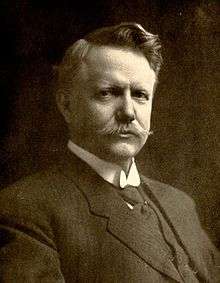Francis Henry Fries

"Colonel" Francis Henry Fries (February 1, 1855 - 5 June, 1931) was an American textile businessman and industrialist from North Carolina.
Biography
Francis Henry Fries was born on February 1, 1855 in Winston-Salem, North Carolina. His parents were Francis Levin Fries and Lisetta Maria Vogler. Fries attended the Salem Boys' School, and later graduating from Davidson College in 1874. At 21 years old, Fries joined his father's textile firm, F & H Fries Manufacturing Company, working as a mechanic and a blacksmith. During his tenure he would work in all of the company's departments. In 1878, Fries traveled with his brother and uncle to Europe, visiting the United Kingdom, France, Germany, Switzerland, and Italy. Upon his return he was promoted to superintendent. On November 23, 1881 he married Letitia Walker Patterson, granddaughter of Governor John Motley Morehead. She and their only child died three years later, both around the same time. In 1866, Fries married Anna P. de Schweinitz, later having a daughter with her.[1] That year he also oversaw the construction of Arista Mills, the first textile mill in North Carolina to have electric lighting.[2]
In 1887, Fries left his father's company. Instead, he was prompted undertake an effort to connect Winston-Salem to Roanoke, Virginia by rail to improve commerce. Supervising all financing and construction, Fries completed what became known as the Roanoke and Southern Railway in four years. He served as the railway's first president.[3] As a Democrat, he served on the staff of Governor Alfred Moore Scales, where he earned the title of "Colonel" which he would use in his professional career to distinguish himself from his father.[1] In 1893, Fries went into banking and became president of the Wachovia Loan and Trust Company. Looking for areas to develop along the Southern Railway, Fries began exploring the possibility of setting up textile mills along the Mayo River. In 1895 he erected the Mayo Mill and established the town of Mayodan.[4] In 1904, he was elected president of the North Carolina Bankers Association.[2] From 1911–1912 Fries served as the president of the trust company section of the American Bankers Association. On November 15, 1917 he was appointed to be director of the state branch of the National War Savings Committee.[1]
Fries died on June 5, 1931.[2]
See also
References
- 1 2 3 Connor, R. D. W.; Boyd, William Kenneth; Hamilton, Joseph Grégoire de Roulhac (1919). History of North Carolina. 5 (illustrated ed.). Chicago and New York City: Lewis Publishing Co. pp. 2–4.
- 1 2 3 Powell, William S., ed. (2000). Dictionary of North Carolina Biography. 2. Univ of North Carolina Press. p. 243. ISBN 9780807867013.
- ↑ "Northwest Almanac: 'Colonel' Fries built mills, a railroad, organized bank", Winston-Salem Journal, 3 June 2001, retrieved 4 November 2016
- ↑ Evelyn D. Causey and Kathryn Gettings Smith (December 2004). "Washington Mills-Mayodan Plant" (pdf). National Register of Historic Places - Nomination and Inventory. North Carolina State Historic Preservation Office. Retrieved 2015-02-01.